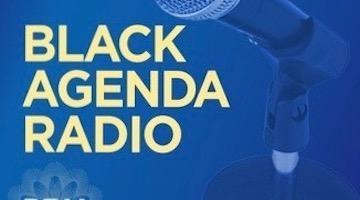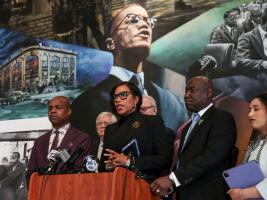The author employs Frantz Fanon’s discussion of protest culture as a lens of analysis of hip-hop in Africa.
“The book connects hip-hop culture to politics around migration, social protest, and gender.”
In this series, we ask acclaimed authors to answer five questions about their book. This week’s featured author is Msia Clark. Clark is Assistant Professor in the Department of African Studies at Howard University. Her book is Hip-Hop in Africa: Prophets of the City and Dustyfoot Philosophers.
Roberto Sirvent: How can your book help BAR readers understand the current political and social climate?
Msia Clark: The book shows many of the similarities in the social struggles people are engaged in around Africa. The book looks at the role of neoliberalism and the international economic system as a source of many of the factors that gave rise to hip-hop as a culture of resistance: rapid urbanization, underemployment, infrastructure neglect, reductions in social services, the erosion of labor laws and protections, etc… While the book looks at hip-hop culture, it connects that culture to politics around migration, social protest, and gender. The book looks at the various relationships between hip-hop and the state throughout Africa. In doing this, the book looks at how states have attempted to harness the power of hip-hop, how states have attempted to repress the power of hip-hop, and how hip-hop artists have attempted to engage the state by holding political office themselves.
Hip-hop has always been a representation of social and political realities. Chuck D called it the “Ghetto CNN”. Mos Def said “You know what's gonna happen with Hip-Hop? Whatever's happening with us. If we smoked out, Hip-Hop is gonna be smoked out. If we doin alright, Hip-Hop is gonna be doin alright”. What the book tries to do is take a cross-continental look at what’s going on with hip-hop culture, in order to have an understanding of what’s going on with Africa.
What do you hope activists and community organizers will take away from reading your book?
There is one chapter that speaks directly to activists and organizers. It uses Frantz Fanon’s discussion of protest and combat culture in his book Wretched of the Earth as a model for examining political hip-hop. The Black Arts Movement was considered the soundtrack to the Black Nationalist Movement. Music is a very powerful tool in social mobilization and community organizing. Fanon talked of two types of culture, or in this case music: music meant for protest and music meant for combat. Both are important, and we cannot move into a combat stage without passing through a protest stage. The book discusses the fact that most artists do not get past the protest stage, but stresses that the protest stage is necessary because it contextualizes and defines the struggle. The book does discuss combat music in Africa. Specifically looking at artists in Senegal, Burkina Faso, Tunisia, Egypt, South Africa, the Congo, and Angola, who moved into the combat stage.
“We cannot move into a combat stage without passing through a protest stage.”
The book also has a chapter on gender, and how women have been using hip-hop as a form of resistance. The book tries to look at the different forms that resistance has taken. Not all of these women have taken the conscious route. But it’s important to look beyond what may make us uncomfortable and recognize the different forms resistance takes as women challenge sexism, and speak on sex and sexuality.
We know readers will learn a lot from your book, but what do you hope readers will un-learn? In other words, is there a particular ideology you’re hoping to dismantle?
I hope to encourage folks to think about several things differently. I hope to introduce additional lenses with which to view Pan Africanism as an idea and as a way of living. We have usually focused on the Diaspora’s connection with Africa, and not looked at the multiple ways the Diasporas and the continent intersect. We need to not only engage the Diaspora in Africa, but to also help engage Africa in the Diaspora. We need these things to happen in ways that promote cultural understandings and prevent misunderstandings and misappropriations.
“Women are rejecting the terms of their participation set by male hip-hop heads.”
I hope to encourage different ways of viewing African women. Hip-hop has tended to want to recognize women who only produce “conscious” music. There has been the practice of trying to direct or dictate the terms by which women can participate in hip-hop culture. But women are really doing their thing in hip-hop. Many of them are not asking for validation and are rejecting the “queen,” “first lady,” and “femcee” labels. In other words, they are rejecting the terms of their participation set by male hip-hop heads, and demanding recognition as MCs. Period.
Who are the intellectual heroes that inspire your work?
The primary influences were Stuart Hall and Frantz Fanon. Stuart Hall was a Jamaican intellectual and was one of the founders of Cultural Studies as a discipline. His works on the impacts of cultural representations on we self-identify, and how we see others, were very influential. Cultural representations (TV, music, film, literature, etc.…) have directly impacted stereotypes of Black and Brown people, and contributed to violence against and within those communities. Hall draws a direct line between the culture we consume and both the oppressions we endure, and our ability to challenge those oppressions. Frantz Fanon’s Wretched of the Earth was one the books that was most influential in shaping me as a scholar. I read it as an undergraduate and it opened up a whole new way of thinking. I was excited to have a project that used Fanon’s discussion of protest culture and combat culture as the lens of analysis.
In what way does your book help us imagine new worlds?
In addition to contributing to some important conversations in African Studies and Cultural Studies, the book is another response to critics of hip-hop culture, those within our communities and within academia. In academic communities, the value of hip-hop studies in Africa is often criticized. This is often because hip-hop is lumped in with popular music. In this way it is seen as being apolitical, or as simply an example of African youth imitating Western culture. The book hopefully helps in the recognition of African hip-hop studies as having the potential for some serious engagement with social, economic, and political discourse in Africa.
Roberto Sirvent is Professor of Political and Social Ethics at Hope International University in Fullerton, CA. He also serves as the Outreach and Mentoring Coordinator for thePolitical Theology Network. He’s currently writing a book with fellow BAR contributor Danny Haiphong called American Exceptionalism and American Innocence: A People’s History of Fake News—From the Revolutionary War to the War on Terror.
COMMENTS?
Please join the conversation on Black Agenda Report's Facebook page at http://facebook.com/blackagendareport
Or, you can comment by emailing us at comments@blackagendareport.com



















